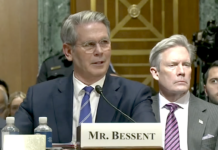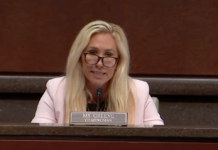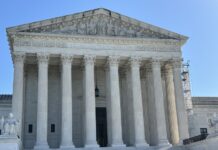
(GA Recorder) — A self-described voting watchdog organization and a Republican state legislator who represents a suburban Atlanta district are suing to prevent the state’s continued use of an electronic voting system that uses a barcode to verify how a ballot is cast.
The nonprofit VoterGa and Rep. Philip Singleton argue in Tuesday’s petition filed in Fulton County Superior Court that the current Dominion Voting Systems ballot marking devices violate state law because voters cannot be certain that the scanned QR codes accurately reflect their votes. The paper ballot voters are given to scan into a computer lists printed names of selected candidates that are supposed to be captured by the barcode.

The machines were widely used in Georgia’s 2020 elections for the first time. The lawsuit asks a judge to ban the machines from future elections so that Georgia voters can be confident that state voting machines, scanners, and election management servers comply with state law.
In the Dominion system, Georgians cast their votes on large touch-screen devices before printing a paper ballot containing their selections and a QR code, or a barcode.
Georgia election code requires that votes be printed on paper ballots in text that can be read by the voter. However, the use of a QR code means that voters can’t confirm how their votes are being recorded, according to the lawsuit.
“The primary (claim) in this petition is this system is illegal because it accumulates in-person votes that are hidden in QR Code,” VoterGA founder Garland Favorito said. “The QR code is unverifiable to the elector even if you have a code reader.”
The complaint comes ahead of this year’s municipal elections across Georgia, including the closely watched Atlanta mayor’s race. The machines will get a bigger workout in next year’s elections when statewide races are up for grabs, including a U.S. Senate seat, the governor’s office, the secretary of state and the attorney general.
Secretary of State Brad Raffensperger is dismissive of the lawsuit.
“Last year in the largest recount in U.S. history, it was proven that the QR code and the plain text both reflect the voter’s choice,” Raffensperger said in a statement. “An academic study showed that voters do review their ballots. This lawsuit is a waste of time and taxpayer money and will fail.”
VoterGa’s petition filed Tuesday cites U.S District Court Judge Amy Totenberg’s October 2019 ruling that denied an injunction to stop the state’s rollout of Dominion machines, citing the short turnaround with November elections looming.
Totenberg did say that electronic voting systems pose security risks and that Dominion’s reliance on the QR code might not align with Georgia law.
Following the 2020 general election, Dominion machines became a target of many supporters of former President Donald Trump who peddled unfounded conspiracy theories that the voting machines flipped thousands of ballots to President Joe Biden.
In early 2019, state lawmakers voted to purchase the $107 million new electronic voting system. State election officials, including Raffensperger, defended the system against several challenges and promoted printed ballots as a solid step that creates an auditable paper trail.
Singleton, of Sharpsburg, was elected in October 2019, several months after Gov. Brian Kemp signed off on the purchase of Dominion machines.
Various organizations, such as the Coalition for Good Governance, have long advocated for paper ballot voting systems rather than electronic devices that some say present a greater security threat. The new voting machines replaced a system that dated to 2002 after awareness grew that the obsolescent software could be hacked.
Favorito is also behind a lawsuit requesting the inspection of 147,000 Fulton absentee ballots from the November 2020 election. In that case, a group of Fulton voters claim their ballot review would reveal widespread fraud and other irregularities, despite the results being confirmed by several counts, including one by hand. Raffensperger declared the 2020 election cycle the most secure in state history.







